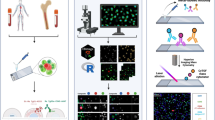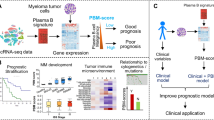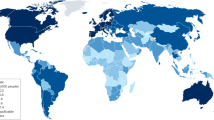Abstract
We studied the prognostic value of clinical and laboratory variables, measured before blood cell transplantation, in predicting complete response among patients undergoing autologous blood cell transplantation for relapsed or primary refractory myeloma. Sixty-seven patients who underwent transplantation for relapsed or primary refractory myeloma were studied. The overall response rate was 90%, and the complete response rate was 33%. Low β2-microglobulin (⩽2.7 mg/l) was associated with a significantly better complete response rate compared with high levels (54 vs19%, P = 0.002). Similarly, the complete response rate was 39% when the bone marrow plasma cell percentage was low (<40%) and 21% with greater involvement (P = 0.04). Complete response rate was 50% when β2-microglobulin and bone marrow plasma cell percentage were low, 36% if either was high, and 12% when both were high (P = 0.01). Median survival measured from initial diagnosis of myeloma was 51 months. Overall survival after transplantation was better among responders who achieved complete response than those who did not: median survival, 24 vs 11 months, P = 0.04 (log-rank) and 0.009 (Gehan–Wilcoxon). Attainment of a complete response independently predicted better survival in a multivariate analysis. β2-Microglobulin and bone marrow plasma cell percentage predict complete responders among patients undergoing transplantation for myeloma.
This is a preview of subscription content, access via your institution
Access options
Subscribe to this journal
Receive 12 print issues and online access
$259.00 per year
only $21.58 per issue
Buy this article
- Purchase on SpringerLink
- Instant access to full article PDF
Prices may be subject to local taxes which are calculated during checkout
Similar content being viewed by others
Author information
Authors and Affiliations
Rights and permissions
About this article
Cite this article
Rajkumar, S., Fonseca, R., Lacy, M. et al. Beta2-microglobulin and bone marrow plasma cell involvement predict complete responders among patients undergoing blood cell transplantation for myeloma. Bone Marrow Transplant 23, 1261–1266 (1999). https://doi.org/10.1038/sj.bmt.1701787
Received:
Accepted:
Published:
Issue date:
DOI: https://doi.org/10.1038/sj.bmt.1701787
Keywords
This article is cited by
-
Impact of early relapse after auto-SCT for multiple myeloma
Bone Marrow Transplantation (2008)
-
A practical guide to defining high-risk myeloma for clinical trials, patient counseling and choice of therapy
Leukemia (2007)
-
High-dose therapy and autologous stem cell transplantation for multiple myeloma poorly responsive to initial therapy
Bone Marrow Transplantation (2004)
-
Controversy in multiple myeloma transplants: tandem autotransplants and mini-allografts
Bone Marrow Transplantation (2001)



